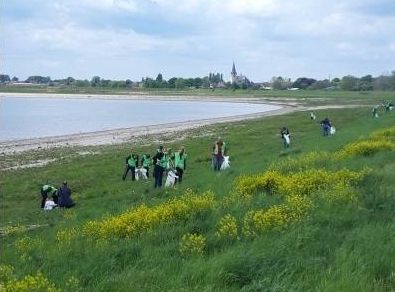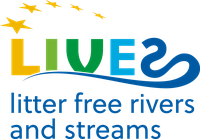LIVES project combats plastic waste in waterways
What and why?
Eight billion kilograms of plastic are transported to the sea via rivers every year: it remains a persistent environmental problem with far-reaching consequences for fauna and flora, the environment, public health and the landscape. Plastic pollution requires a sustainable and cross-border approach.
Purpose of the project
 By making more intensive use of litter traps, the VMM and its partners aim to reduce the amount of plastic in the Meuse basin by 50% within two years. In the first phase, we carry out an audit to determine the size, nature and distribution of the waste. In phase two, we develop and promote new trapping techniques and focus on prevention, transportation and recycling of plastic waste. In the third phase, we intend to develop a sustainable preventive approach and lay down policy.
By making more intensive use of litter traps, the VMM and its partners aim to reduce the amount of plastic in the Meuse basin by 50% within two years. In the first phase, we carry out an audit to determine the size, nature and distribution of the waste. In phase two, we develop and promote new trapping techniques and focus on prevention, transportation and recycling of plastic waste. In the third phase, we intend to develop a sustainable preventive approach and lay down policy.
LIVES in Europe
The LIVES project is being carried out within the framework of the Interreg VA programme of the Meuse-Rhine Euroregion, having been allocated 735,300 euros from the European Fund for Regional Development.
Under the leadership of the provincial government of Dutch Limburg, the Flanders Environment Agency is working with Dutch and German partners to find a cross-border solution for the Meuse river basin. The VMM will gather and further develop its expertise in drift waste and harmonise this more effectively with partners in neighbouring regions to ensure a more sustainable approach to the problem of plastic waste.
| Project partners | |
|---|---|
| Belgium |
Flanders Environment Agency Openbare Vlaamse Afvalstoffenmaatschappij De Vlaamse Waterweg NV |
| the Netherlands |
Provincie Limburg Waterschap Limburg Rijkswaterstaat - Ministerie van Infrastructuur en Waterstaat Zuyd Hogeschool Open Universiteit |
| Germany |
Wasserverband Eifel-Rur RWTH Aachen |
Duration: 01/08/2018 - 31/01/2022
Programme: Interreg V Meuse-Rhine Euregion




